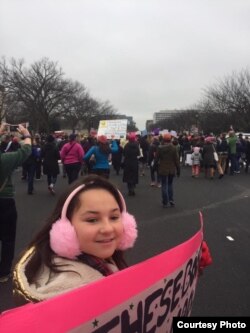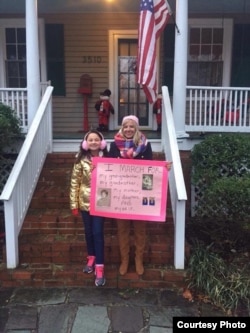Katie Filipczyk Howard has always known that she was a "feminist," but not a militant one.
"Being a feminist means you are pro-woman. It doesn't mean that you hate men," she said.
So it wasn't unusual that this 42-year-old running coach and writer would attend the 2017 Women's March on Washington.
What gave Howard pause, however, was the decision to take her 9-year-old daughter Hannah. A year later, she says she knows it was the right decision.
"Hannah has become more empowered to speak up for herself," she said.
Hannah said she gained "courage" by being there, as did many women attending what would become one of the largest protests in U.S. history, with marches held in nearly 700 cities.
Cultural earthquake
Many credit the January 21 Women's March for being the catalyst for change, improving the lives of women in 2017.
Howard said it started a "cultural earthquake" because it demonstrated that there is power in numbers.
"We feel less alone," she said. "We have more allies as a collective and can make great change."
That feeling of fellowship also spread to changes in workplace behaviors.
WATCH: Women's March, Election Led to Progress for Women
Just months after the march, allegations of sexual harassment against high-profile men in Hollywood would inspire women to make similar kinds of allegations in other walks of life. A #MeToo movement began on social media, connecting women of similar experiences and demonstrating the depth of the problem.
Within three months, more than 100 high-profile men — in entertainment, journalism and politics — would be accused of sexual harassment, with many losing their jobs because of it. The revolution in the reporting of sexual harassment spawned a "Time's Up" movement aimed at ending sexual misconduct and promoting gender equality in Hollywood.
Female face on politics
The march is also credited (as is the 2016 election) for bringing more women into the political arena.
A record number of women — nearly 400 — plan to run for the U.S. Senate or House of Representatives this year. Female candidate training programs were established across the country.
Florida participant Joselyne Fliger said she was tired of experiencing a dismissive feeling from men, and she's pondering which political race to enter. Her goal is to make a better world for the next generation, like her 3-year-old daughter. "I want her to not have to go through what I've gone through," she said.
Wage gap
Despite improvements in some areas, American women still lag behind their male counterparts in earnings.
According to data from the Bureau of Labor Statistics from the final quarter of 2017, female workers on average were paid $769 per week versus $946 for male workers, nearly 20 percent less.
Chandra Childers, a senior researcher with the Institute for Women's Policy Research, said some women are afraid of speaking out against sexual harassment and contributing to the #MeToo movement for fear of losing their jobs.
"Eighty percent of African-Americans with children under 18 are breadwinners," Childers said. "So when your family is dependent upon your already low wages, it makes it much harder to be able to walk away."
Raising wages
Women traditionally have held lower-wage jobs, but experts can't agree on why.
George Washington University law professor Naomi Cahn said the effects of the gender pay gap can be seen early in women's careers, within a year after they graduate from college. She said change needs to be cultivated as early as childhood, with grade school teachers "making sure girls are encouraged to do math and science."
March anniversary
Howard and her daughter enjoy looking through their Facebook posts from a year ago: images of Hannah with her pink fuzzy earmuffs in front of a sea of other females wearing pink on the Washington Mall, and Howard as the proud mama holding their poster, which read: "I march for my great-grandmother, my grandmother, my mother, my daughters."
This year, Howard will add her second daughter to the quest, as 7-year-old Heidi joins them to retrace their steps from a year ago.































